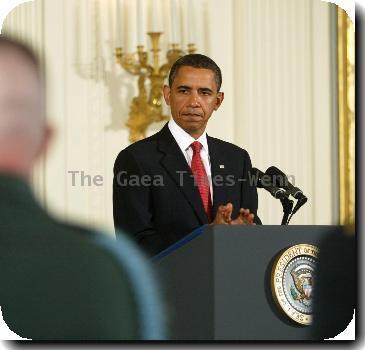As US embassy reopens, Yemeni officials show friction with US over terror fight
By Lee Keath, APTuesday, January 5, 2010
Yemen shows frictions with US over terror fight
SAN’A, Yemen — Yemen showed signs of friction Tuesday with the United States over the fight against al-Qaida, insisting it has the terror group under control, as the U.S. Embassy in San’a ended a two-day closure.
Even as Yemeni forces have been hitting back against al-Qaida hideouts in recent days, comments by senior regime officials appear to reflect fears that Washington wants to snatch away the lead in directing the counterterror campaign.
The government is deeply sensitive about appearing to be following an American lead before a population where distrust of the United States is high.
The Yemeni complaints underscore how Washington and its allies have to step carefully as they work closer with the San’a government against al-Qaida. The government has little control outside the capital, leaving a power vacuum in large swaths of the mountainous, impoverished nations.
Heavily armed tribes hold sway in many areas, and some have allowed al-Qaida fighters to take refuge there.
The U.S. Embassy in San’a reopened its doors Tuesday after the two-day closure, saying Yemeni forces had tackled the feared threat. The British Embassy, which had also closed Sunday, resumed operations except for its consular and visa sections.
Other Western embassies maintained heightened security Tuesday, including the French and Czech embassies, which were operational but closed to the public, and the Spanish and German embassies, which were restricting the number of visitors.
The U.S. Embassy said in a statement on its Web site that “successful counter-terrorism operations conducted by government of Yemen security forces Jan. 4 north of the capital have addressed a specific area of concern,” allowing the facility’s reopening.
It said the threat of terrorist attacks against American interests remained high and urged its citizens in Yemen to be “vigilant and take prudent security measures.”
On Monday, Yemeni security officials killed two suspected al-Qaida militants in a clash northeast of San’a. In addition, Yemeni forces arrested five others in the capital and the western region of Hodeida in recent days, the Interior Ministry said.
However, several Yemeni security and government officials privately expressed anger over the embassy closures, saying they gave the impression Yemeni security forces were not able to protect foreign missions. The officials spoke to The Associated Press on condition of anonymity because of the sensitivity of U.S.-Yemeni ties.
The Interior Ministry on Tuesday showed signs of indignation, touting the advanced training of security forces guarding embassies.
“There is nothing to fear from any threats of terror attack,” it said in a statement. “Security is good in the capital and the provinces, and there is no fear for the lives of any foreigner or foreign embassy.”
Security forces “have imposed a security cordon around al-Qaida elements everywhere they are present, and the security forces are observing and pursuing them around the clock,” the ministry said.
The U.S. has dramatically stepped up counterterrorism aid to Yemen, and President Barack Obama over the weekend promised a close partnership with San’a to fight the al-Qaida offshoot in the country. The group is blamed in the Christmas attempt to bomb a U.S. passenger jet.
Yemen’s government has enthusiastically accepted the aid and has vowed to act against the group, carrying out its heaviest strikes against its hideouts in years last month, with U.S. help.
However, Yemeni officials have repeatedly said Western aid should be limited to training and funding counterterror forces, apparently worried that Washington will try to take a major role in directing the fight. They have repeatedly shown discontent over suggestions Yemen cannot handle the job itself.
On Monday, Foreign Minister Abu Bakr al-Qirbi dismissed warnings by some in the United States that Yemen could spiral into greater instability like Afghanistan and Pakistan.
“The situation in Yemen is different and cannot be compared to Afghanistan and Pakistan,” al-Qirbi told journalists during a visit to Qatar, according to Yemeni media.
“There is international concern over al-Qaida in Yemen, and Yemen is able to deal with these groups,” he said. “But it is in need of help in training and preparing its counterterrorism forces, as well as economic aid because at the heart, the problem is economic.”
Over the weekend, the head of Yemen’s National Security Agency, Ali al-Anisi, played down the threat of terrorism in his country, “Yemen is not a refuge for al-Qaida, as some claim. These are exaggerations.”
Secretary of State Hillary Rodham Clinton said Monday that internal unrest and a surge in al-Qaida activity in Yemen pose a global threat.
Clinton praised the Yemeni government for recent steps it has taken to combat extremists but said that at the London conference the United States and its allies will tell the Yemeni government that there are “expectations and conditions” it must meet for it to continue to enjoy support from the West.
____
On the Net:
U.S. Embassy in Yemen: yemen.usembassy.gov/
(This version CORRECTS time element in lede.))
Tags: Barack Obama, Embassies, Middle East, National Security, North America, San'a, Sana'a, Terrorism, United States, Yemen









